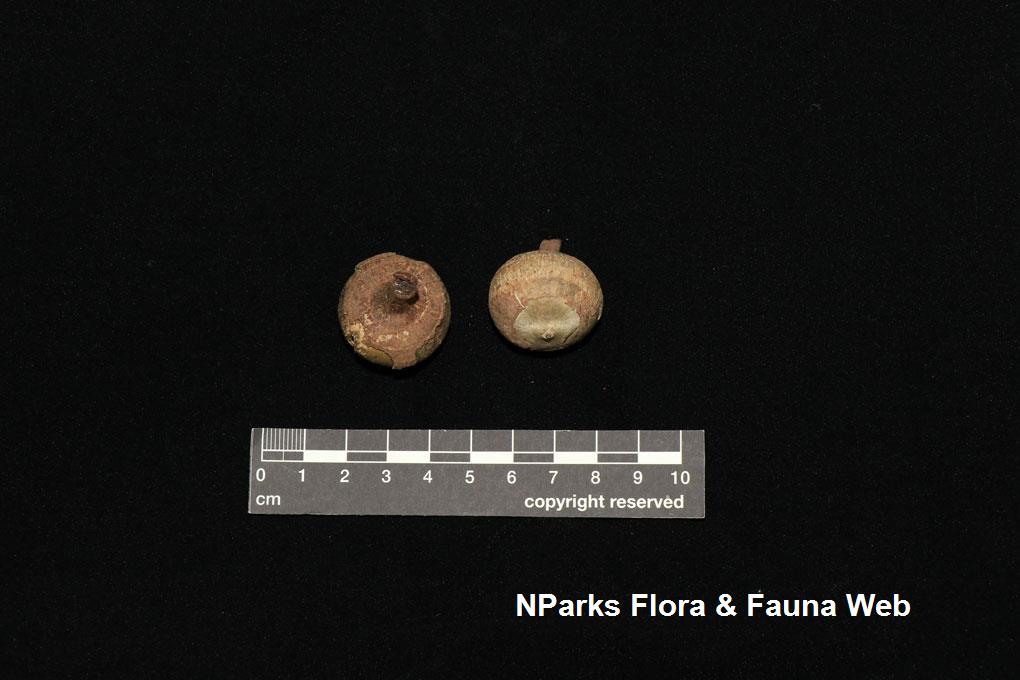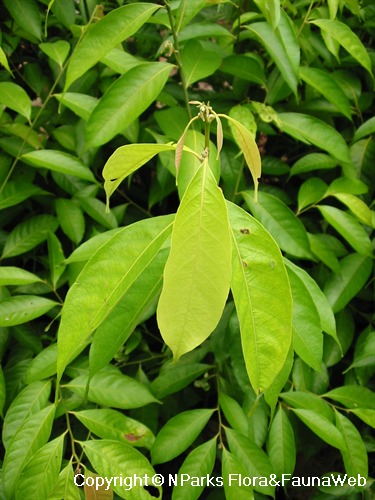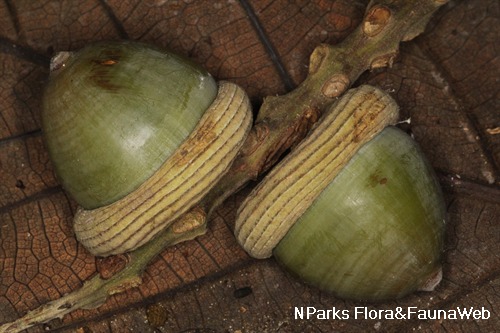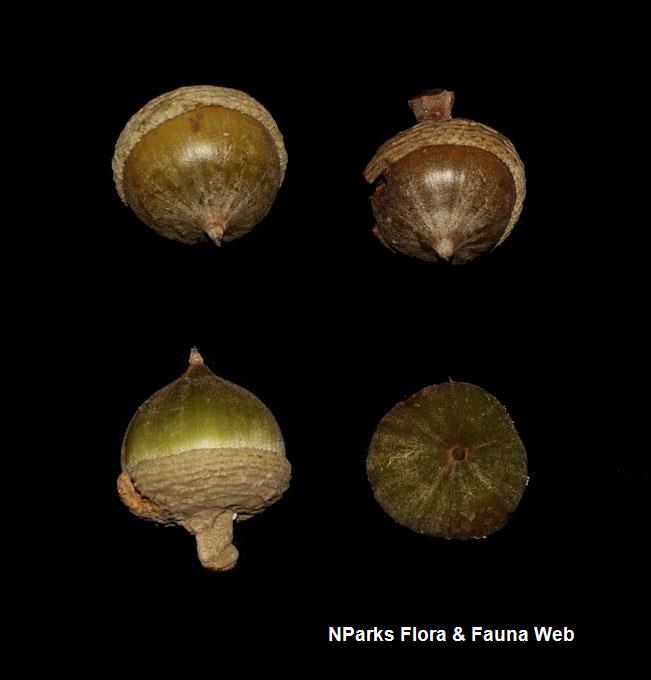
Back
Lithocarpus encleisacarpus (Korth.) A.Camus
| Family Name: | Fagaceae |
| Synonyms: | Pasania encleisacarpa (Korth.) Gamble |
| Common Name: | Mempening puteh, Berangan babi hutan, 封果柯 |
Lithocarpus encleisacarpus or Mempening puteh is a large tree native to Singapore. Growing to 50 m tall, it has thin, leathery leaves, dark brown above, glaucous and densely hairy below. Leaves have 7 - 12 looping lateral veins, connected near the margins. Flowers are monoecious or androgynous, covered in dense yellowish hairs, held on an inflorescence. The male flowers are either held singly or in clusters of 3, female flowers are held singly and rarely in clusters. It produces flattened ovoid to globose fruit with silver, velvety hairs held by a cupule which encloses the fruit completely. The cupule wall is less than 1 mm thick with yellowish, velvet hairs.
Name
Classifications and Characteristics
| Plant Division | Angiosperms (Flowering Seed Plants) (Dicotyledon) |
|---|---|
| Plant Growth Form | Tree (Big (>30m)) |
| Maximum Height | 50 m |
Biogeography
| Native Distribution | Peninsular Thailand, Sumatra, Peninsular Malaysia, Singapore, Borneo |
|---|---|
| Native Habitat | Terrestrial (Primary Rainforest, Secondary Rainforest) |
| Preferred Climate Zone | Tropical |
| Local Conservation Status | Native to Singapore (Critically Endangered (CR)) |
Description and Ethnobotany
| Growth Form | It is a large tree that can grow to 50 m tall with buttresses up to 1 m in height. |
|---|---|
| Foliage | Leaves are thin, leathery, elliptic, dark greyish or reddish-brown on the top surface, bluish grey, densely hairy below. The leaves have 7 - 12 pairs of lateral veins, often looping and joining near the margins. Both the lateral veins and midrib are prominent below. |
| Flowers | Flowers are either monoecious where the male and female flowers are held on the same individuals or androgynous where flowers are bisexual. They are held on an inflorescence covered in dense, yellowish hairs. The male flowers are held singly or in clusters of 3 held on a stalk of 10 -15 cm long while the female or bisexual flowers are usually held singly or rarely in clusters of 2 -3 on a 10 - 20 cm stalk. |
| Fruit | The fruit is flattened, oval to globose with silver, velvety hairs held by a cap (cupule) that encloses the fruit completely. The cupule wall covering is less than 1 mm thick, with yellowish velvet hairs. |
| Habitat | Occurs commonly in forest, lowland and lower montane forest up to 1,300 m altitude. <1,2> |
| Cultivation | It can be propagated by seed. |
| Etymology | The genus Lithocarpus, Greek, lithos meaning stone, karpos meaning fruit; the hard and woody cupule and acorn. The species epithet encleisacarpus, Greek, enkleiein meaning enclosed, karpos meaning fruit; with acorn completely enclosed by the cupule. |
| Ethnobotanical Uses | Timber & Products: The wood is termed as mempening, used for house construction and also used a firewood. The bark contains tannin and is also used to dye rattan and cotton brown. |
Plant Care and Propagation
| Light Preference | Full Sun |
|---|---|
| Water Preference | Moderate Water |
| Plant Growth Rate | Moderate |
| Rootzone Tolerance | Fertile Loamy Soils, Well-Drained Soils |
| Propagation Method | Seed |
Foliar
| Foliage Retention | Evergreen |
|---|---|
| Mature Foliage Colour(s) | Silver / Grey |
| Foliar Type | Simple / Unifoliate |
| Foliar Arrangement Along Stem | Spiral |
| Foliar Attachment to Stem | Petiolate |
| Foliar Shape(s) | Non-Palm Foliage (Elliptical) |
| Foliar Venation | Recticulate |
| Foliar Margin | Entire - Wavy / Undulate |
| Foliar Apex - Tip | Acuminate, Acute |
| Foliar Base | Acute, Rounded / Obtuse |
Non - Foliar and Storage
| Stem Type & Modification | Woody |
|---|
Floral (Angiosperm)
| Flower & Plant Sexuality | Unisexual & Bisexual Flowers(Sub-dioecious) , Monoecious |
| Flower Grouping | Cluster / Inflorescence |
|---|
| Flower Location | Axillary, Terminal |
| Flowering Habit | Polycarpic |
Fruit, Seed and Spore
| Mature Fruit Colour(s) | Silver / Grey |
|---|---|
| Mature Fruit Texture(s) | Velvety / Furry / Tomentose |
| Fruit Classification | Simple Fruit |
| Fruit Type |
References
| References | <1> Soepadmo, E. (1972). Fagaceae. In: van Steenis, C.G.G.J. (ed.) Flora Malesiana, ser. 1, Seed Plants, vol. 7, pt. 2, pp. 338. Jakarta: Noordhoff-Kolff N.V. <2> Lemmens, R.H.M.J., Soerianegara, I. & Wong W.C. (1995). PROSEA, No. 5(2) Timber Trees: Minor Commercial Timbers, pp. 294. Leiden: Backhuys Publishers. |
|---|
Image Repository
Others
| Master ID | 34445 |
|---|---|
| Species ID | 8858 |
| Flora Disclaimer | The information in this website has been compiled from reliable sources, such as reference works on medicinal plants. It is not a substitute for medical advice or treatment and NParks does not purport to provide any medical advice. Readers should always consult his/her physician before using or consuming a plant for medicinal purposes. |





